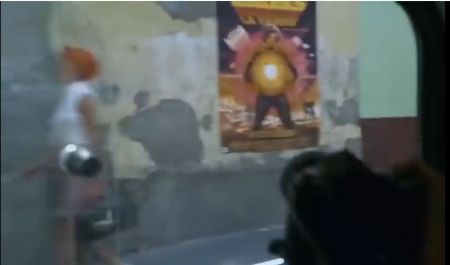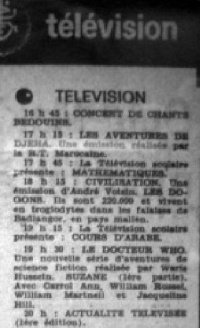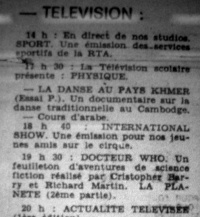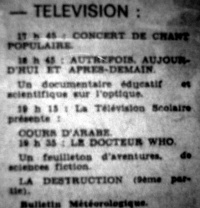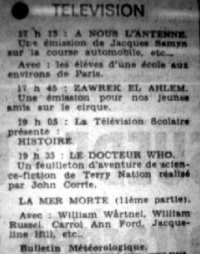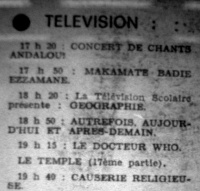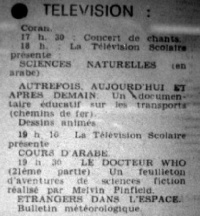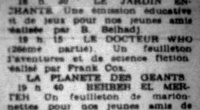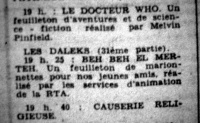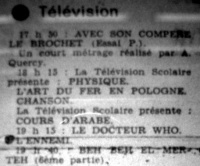Difference between revisions of "Algeria"
Jon Preddle (talk | contribs) |
Jon Preddle (talk | contribs) |
||
| (10 intermediate revisions by the same user not shown) | |||
| Line 4: | Line 4: | ||
{| {{small-table}} | {| {{small-table}} | ||
|- | |- | ||
| − | |'''Country Number (35)'''||1973||[[Selling Doctor Who|SECOND | + | |'''Country Number (35)'''||1973||[[Selling Doctor Who|SECOND WAVE]] |
|- | |- | ||
|'''Region'''||[[:Category:Africa|Africa]]|| | |'''Region'''||[[:Category:Africa|Africa]]|| | ||
| Line 32: | Line 32: | ||
| − | =='''DOCTOR WHO | + | =='''DOCTOR WHO IN ALGERIA'''== |
| + | =='''ادكتورهو / LE DOCTEUR WHO'''== | ||
| − | Algeria was the '''35th''' country to screen '''Doctor Who'''. It was the last to screen the [[William Hartnell stories|William Hartnell stories]] | + | Algeria was the '''35th''' country to screen '''Doctor Who'''. It was the last to screen the [[William Hartnell stories|William Hartnell stories]] in the 1970s (see [[Selling Doctor Who]].) |
| + | |||
| + | ==[[Peter Cushing]] and the Daleks== | ||
| + | [[File:Daleks poster Z.JPG|right|thumb|450px|Screen grab from the 1969 movie "Z" showing the French poster of the second Peter Cushing Dalek film]] | ||
| + | |||
| + | The second of the two [[Peter Cushing]] Dalek movies appears to have been shown in Algeria. | ||
| + | |||
| + | The 1969 political thriller '''''"[[Wikipedia:Z (1969 film)|Z]]"''''' directed by Costa-Gavras was filmed in Algiers that year. During a sequence with the two main characters driving a car through the city streets, they pass a wall onto which has been affixed the poster for '''"Les Daleks Envahissant la Terre"''', the French title of the film. | ||
| + | |||
| + | Assuming that this is an authentic advertisement from the day and not a piece of set-dressing added by the film-makers, the solitary paper poster – which doesn't bear the name of a cinema or have dates and session times, and it must be said looks a bit ''too clean'' and unmarked for an exposed paper artefact – can't have been on the uneven wall surface for very long, which might indicate the Dalek film was a relatively recent release. | ||
| + | |||
| + | The French-dubbed film possibly also had Arabic subtitles. | ||
| + | {{clear}} | ||
==[[BBC Records]]== | ==[[BBC Records]]== | ||
| + | |||
'''The Seventies''' records a sale of '''"(4)"''' stories prior to February 1977. '''The Handbook''' identifies these as: {{C}}, {{E}}, {{K}} and {{L}}. | '''The Seventies''' records a sale of '''"(4)"''' stories prior to February 1977. '''The Handbook''' identifies these as: {{C}}, {{E}}, {{K}} and {{L}}. | ||
In '''DWM''', Algeria is identified in '''nine''' story Archives: {{A}}, {{B}}, {{C}}, {{E}}, {{F}}, {{G}}, {{J}}, {{K}}, and {{L}}. | In '''DWM''', Algeria is identified in '''nine''' story Archives: {{A}}, {{B}}, {{C}}, {{E}}, {{F}}, {{G}}, {{J}}, {{K}}, and {{L}}. | ||
| − | + | ||
==Stories bought and broadcast== | ==Stories bought and broadcast== | ||
| Line 73: | Line 87: | ||
The programme was supplied as 16mm black and white film prints with [[Arabic]] soundtracks. | The programme was supplied as 16mm black and white film prints with [[Arabic]] soundtracks. | ||
| − | Only part one of [[An Unearthly Child]] was | + | Only part one of [[An Unearthly Child]] was supplied to Algeria. |
| + | |||
====Origin of the Prints?==== | ====Origin of the Prints?==== | ||
| − | [[Libya]] was the Arabic nation | + | [[Libya]] was the last Arabic nation to screen '''Doctor Who''' prior to Algeria – the same '''37''' episodes were purchased by that country in late 1969. However, since Libya was suffering a political revolution at that time (from September 1969), and the fate of those films is unknown, the film prints acquired by Algeria may have originated from [[Jordan]], where the series had screened sometime around 1969, or more directly from neighbouring [[Morocco]]. |
| Line 93: | Line 108: | ||
===[[William Hartnell stories|WILLIAM HARTNELL]]=== | ===[[William Hartnell stories|WILLIAM HARTNELL]]=== | ||
| − | The series started on Monday, '''31 December 1973''', at 7.30pm, and screened seven days a week in | + | The series started on Monday, '''31 December 1973''', at 7.30pm, and screened seven days a week in a variety of different timeslots (ranging from 5.55pm to 7.35pm) until Tuesday, '''7 February 1974''' - an almost uninterrupted run of 37 episodes over a 39 day period. The 12 and 13 January scheduled episodes must have been pre-empted, as the same two episodes are also listed as screening on '''14 and 15 January'''. |
There is no clear record that Algeria screened '''Doctor Who''' again, even after the introduction of PAL colour. | There is no clear record that Algeria screened '''Doctor Who''' again, even after the introduction of PAL colour. | ||
| Line 102: | Line 117: | ||
It is not known what happened to these [[Arabic]] prints. The fact that the BBC held a collection of [[Arabic]] prints in late 1976 might indicate that Algeria sent the films to England sometime after broadcasts had completed. | It is not known what happened to these [[Arabic]] prints. The fact that the BBC held a collection of [[Arabic]] prints in late 1976 might indicate that Algeria sent the films to England sometime after broadcasts had completed. | ||
| + | |||
| + | The film print for [[The Aztecs]] part four, bearing a label from the Moroccan TV station, is owned by a private film collector. | ||
| + | |||
==TV listings== | ==TV listings== | ||
{{airdates-left|}} | {{airdates-left|}} | ||
| − | TV listings have been obtained from the newspaper ''El Moujahid'', a French language paper | + | TV listings have been obtained from the newspaper ''El Moujahid'', a French language paper. |
In the French paper, the series was called '''Le Docteur Who''', which is the French equivalent of the [[Arabic]] title '''{{Arabic}}'''. | In the French paper, the series was called '''Le Docteur Who''', which is the French equivalent of the [[Arabic]] title '''{{Arabic}}'''. | ||
| − | The 31 December issue called the series '''"un feuilleton d’aventure des science-fiction"''', which translates as '''"a science fiction adventure series"'''. It also names the main cast as '''"Carrol Ann, William Russel, William Martnell et Jacqueline Hill"''' (sic). The lead | + | The 31 December issue called the series '''"un feuilleton d’aventure des science-fiction"''', which translates as '''"a science fiction adventure series"'''. It also names the main cast as '''"Carrol Ann, William Russel, William Martnell et Jacqueline Hill"''' (sic). The lead actors for [[The Keys of Marinus]] part one, are named as '''"William Wartnel, William Russel, Carrol Ann Ford, Jacqueline Hill"''' (sic). |
| − | A majority of the listings also give the episode number - e.g. '''1ere partie''' 1st part), '''12eme partie''' (12th), '''23eme partie''' (23rd), '''34 partie'''. | + | A majority of the listings also give the episode number - e.g. '''1ere partie''' (1st part), '''12eme partie''' (12th), '''23eme partie''' (23rd), '''34 partie''', etc. |
Some of the listings also give the name of the director (réalisé par), although in some cases these are wrong, with Frank Cox, John Cox (!) or Melvin Pinfield (sic) sometimes being credited for episodes they didn’t direct. | Some of the listings also give the name of the director (réalisé par), although in some cases these are wrong, with Frank Cox, John Cox (!) or Melvin Pinfield (sic) sometimes being credited for episodes they didn’t direct. | ||
| − | '''"La | + | '''"La Planete des Geants"''' is credited three times – on 27, 28, 29 January – but the first for which should be part six of [[The Sensorites]]. |
===French titles=== | ===French titles=== | ||
| − | The newspaper identified the episode titles by | + | The newspaper identified the episode titles by the French translations of the adopted [[Arabic]] titles, which in some cases differ significantly from the original English: |
{| {{small-table}} | {| {{small-table}} | ||
Latest revision as of 20:10, 1 January 2023
ALGERIA is in North Africa; it is the second largest country on the African continent. Once a French colony, it gained its independence in 1962.
Profile
| Country Number (35) | 1973 | SECOND WAVE |
| Region | Africa | |
| Television commenced | December 1956 | |
| Colour System | 1979 | PAL |
| Population | 1974 | 14,700,000 |
| TV Sets | 1974 | 155,000 |
| Language/s | Arabic | French |
Television Stations / Channels
Algeria began its television service in 1956. Colour transmissions began in 1979 with the PAL colour system. There is just one television station: Radiodiffusion Television Algerienne (RTA).
Language/s
The principal languages of Algeria are Arabic and French; Doctor Who would most certainly have been broadcast with the Arabic soundtrack that was provided by the BBC. Given that the French newspapers had TV listings in French, it is likely that the broadcasts also had French subtitles.
DOCTOR WHO IN ALGERIA
ادكتورهو / LE DOCTEUR WHO
Algeria was the 35th country to screen Doctor Who. It was the last to screen the William Hartnell stories in the 1970s (see Selling Doctor Who.)
Peter Cushing and the Daleks
The second of the two Peter Cushing Dalek movies appears to have been shown in Algeria.
The 1969 political thriller "Z" directed by Costa-Gavras was filmed in Algiers that year. During a sequence with the two main characters driving a car through the city streets, they pass a wall onto which has been affixed the poster for "Les Daleks Envahissant la Terre", the French title of the film.
Assuming that this is an authentic advertisement from the day and not a piece of set-dressing added by the film-makers, the solitary paper poster – which doesn't bear the name of a cinema or have dates and session times, and it must be said looks a bit too clean and unmarked for an exposed paper artefact – can't have been on the uneven wall surface for very long, which might indicate the Dalek film was a relatively recent release.
The French-dubbed film possibly also had Arabic subtitles.
BBC Records
The Seventies records a sale of "(4)" stories prior to February 1977. The Handbook identifies these as: C, E, K and L.
In DWM, Algeria is identified in nine story Archives: A, B, C, E, F, G, J, K, and L.
Stories bought and broadcast
WILLIAM HARTNELL
Nine stories, 37 episodes:
| A | An Unearthly Child | 1 |
| B | The Daleks | 7 |
| C | Inside the Spaceship | 2 |
| E | The Keys of Marinus | 6 |
| F | The Aztecs | 4 |
| G | The Sensorites | 6 |
| J | Planet of Giants | 3 |
| K | The Dalek Invasion of Earth | 6 |
| L | The Rescue | 2 |
The programme was supplied as 16mm black and white film prints with Arabic soundtracks.
Only part one of An Unearthly Child was supplied to Algeria.
Origin of the Prints?
Libya was the last Arabic nation to screen Doctor Who prior to Algeria – the same 37 episodes were purchased by that country in late 1969. However, since Libya was suffering a political revolution at that time (from September 1969), and the fate of those films is unknown, the film prints acquired by Algeria may have originated from Jordan, where the series had screened sometime around 1969, or more directly from neighbouring Morocco.
Transmission
WILLIAM HARTNELL
The series started on Monday, 31 December 1973, at 7.30pm, and screened seven days a week in a variety of different timeslots (ranging from 5.55pm to 7.35pm) until Tuesday, 7 February 1974 - an almost uninterrupted run of 37 episodes over a 39 day period. The 12 and 13 January scheduled episodes must have been pre-empted, as the same two episodes are also listed as screening on 14 and 15 January.
There is no clear record that Algeria screened Doctor Who again, even after the introduction of PAL colour.
Fate of the Prints?
Algeria was the last country to purchase the William Hartnell stories. The BBC was already at that time (1973/74) actively selling the Jon Pertwee stories in both colour and b/w formats.
It is not known what happened to these Arabic prints. The fact that the BBC held a collection of Arabic prints in late 1976 might indicate that Algeria sent the films to England sometime after broadcasts had completed.
The film print for The Aztecs part four, bearing a label from the Moroccan TV station, is owned by a private film collector.
TV listings
| ← AIRDATES ...... (CLICK ICON TO GO TO TABLE SHOWING EPISODE BREAKDOWN AND AIRDATES - N/S = story title is Not Stated) |
TV listings have been obtained from the newspaper El Moujahid, a French language paper.
In the French paper, the series was called Le Docteur Who, which is the French equivalent of the Arabic title الدكتور هو.
The 31 December issue called the series "un feuilleton d’aventure des science-fiction", which translates as "a science fiction adventure series". It also names the main cast as "Carrol Ann, William Russel, William Martnell et Jacqueline Hill" (sic). The lead actors for The Keys of Marinus part one, are named as "William Wartnel, William Russel, Carrol Ann Ford, Jacqueline Hill" (sic).
A majority of the listings also give the episode number - e.g. 1ere partie (1st part), 12eme partie (12th), 23eme partie (23rd), 34 partie, etc.
Some of the listings also give the name of the director (réalisé par), although in some cases these are wrong, with Frank Cox, John Cox (!) or Melvin Pinfield (sic) sometimes being credited for episodes they didn’t direct.
"La Planete des Geants" is credited three times – on 27, 28, 29 January – but the first for which should be part six of The Sensorites.
French titles
The newspaper identified the episode titles by the French translations of the adopted Arabic titles, which in some cases differ significantly from the original English:
| 1 | Suzane | Susan |
| 2 | La Planete | The Planet |
| 3 | Les Survivants | The Survivors |
| 4 | L'Evasion | The Escape |
| 5 | not known | |
| 6 | La Mobilisation | The Mobilisation / The Liquidation |
| 7 | Le Malheur | The Misfortune / Bad Luck |
| 8 | Le Sauvetage | The Rescue / Salvage |
| 9 | La Destruction | The Destruction |
| 10 | Le Desastre | The Disaster |
| 11 | La Mer Morte | The Dead Sea |
| 12 | L'Araignee | The Spider |
| 13 | La Foret Bruyante | The Noisy Forest |
| 14 | La Terreur | The Terror |
| 15 | La Sentence de Mort | The Sentence of Death |
| 16 | Les Yeux de Maurinius | The Eyes of Marinus |
| 17 | Le Temple | The Temple |
| 18 | Les Soldats de la Mort | The Soldiers of Death |
| 19 | Le Sacrifice | The Sacrifice |
| 20 | Jours Sombres | Dark Days |
| 21 | Etrangers dans l'Espace | Strangers in Space |
| 22 | Variations | Changes |
| 23 | Danger | Danger |
| 24 | La Race Eteinte | The Extinct Race |
| 25 | not known | |
| 26 | not known | |
| 27 | La Planete des Geants | The Planet of the Giants |
| 28 | not known | |
| 29 | not known | |
| 30 | not known | |
| 31 | Les Daleks | The Daleks |
| 32 | Le Jour du Retour | The Day of Return / of Recurrence |
| 33 | not known | |
| 34 | not known | |
| 35 | not known | |
| 36 | L'Ennemi | The Enemy |
| 37 | Mesures Desesperees | Desperate Measures |
- Episode 24 is printed as "LA RAGE ETEINTE" in El Moujahid; we think this is a printing error, and that the title should be "LA RACE ETEINTE", "The Extinct Race", which in the context of the narrative, makes better sense than does "The Extinct Rage".
